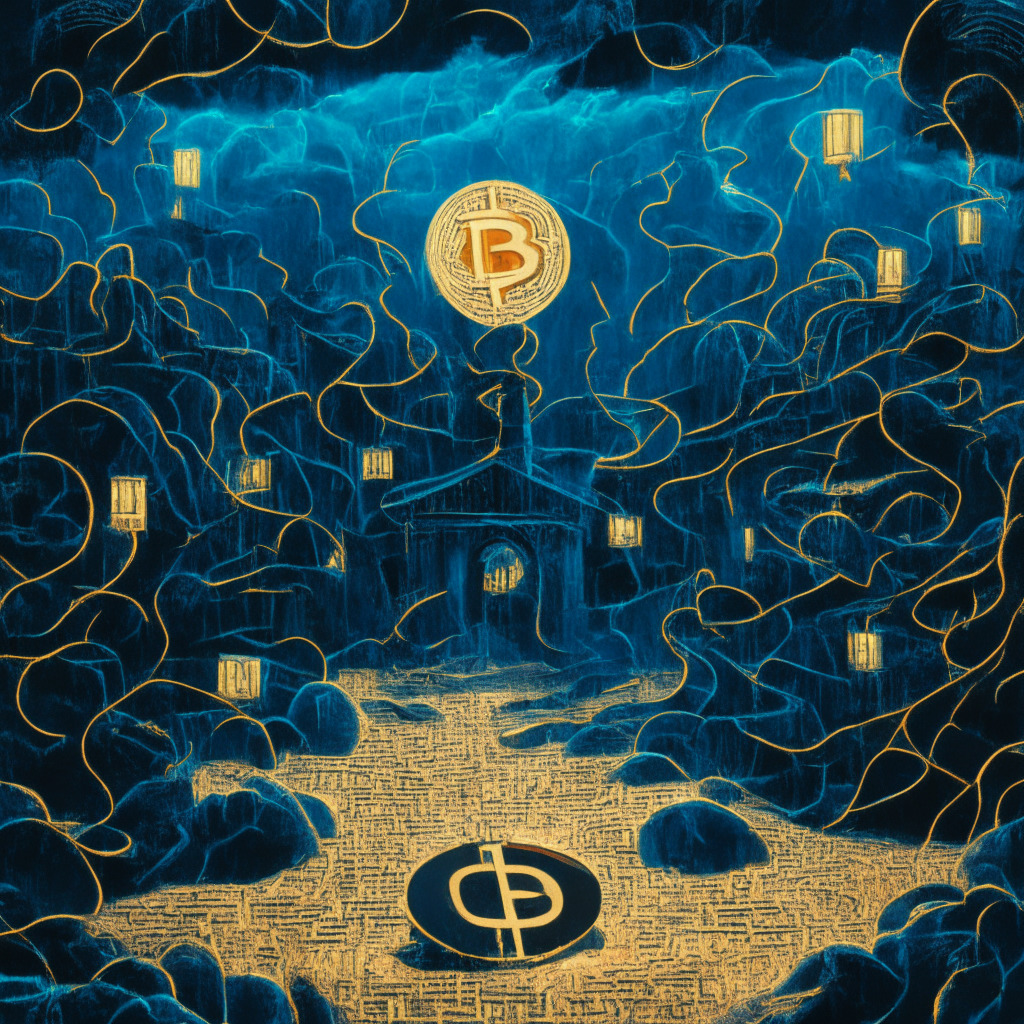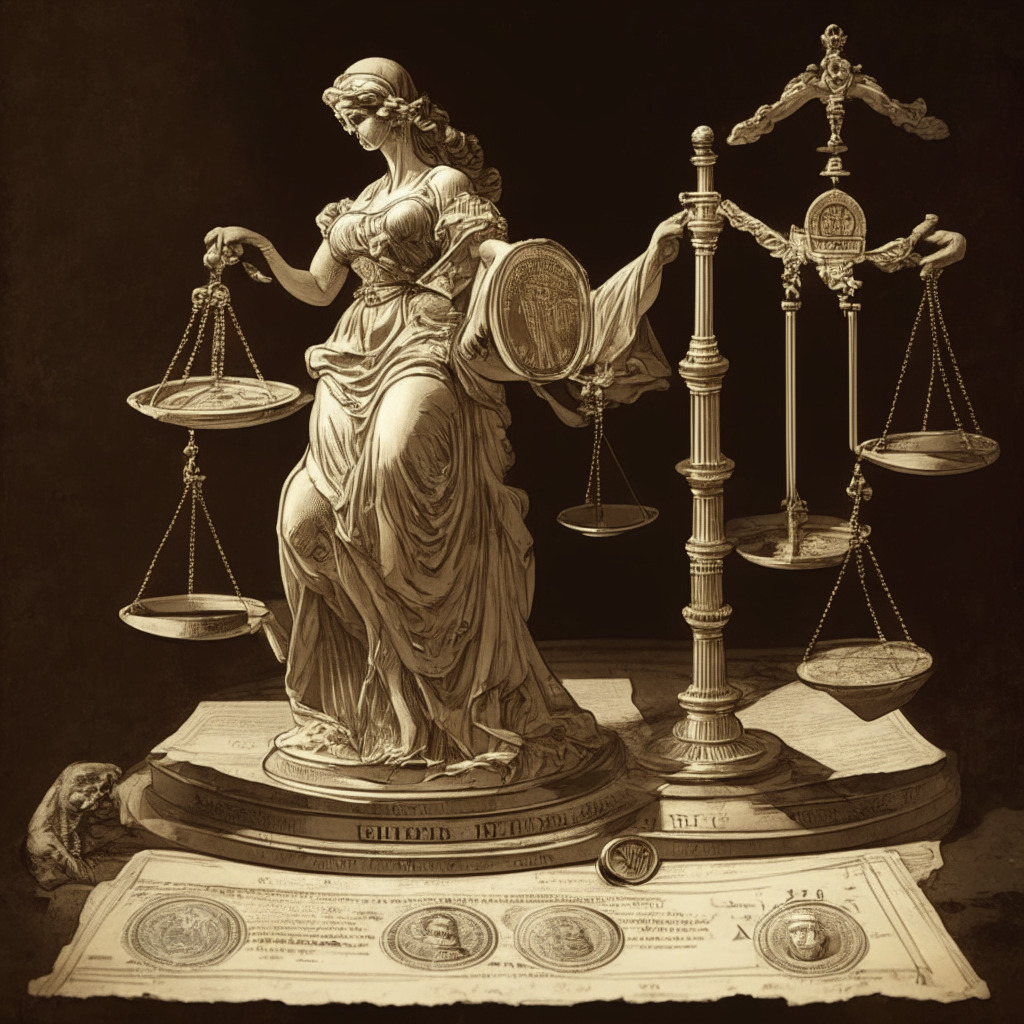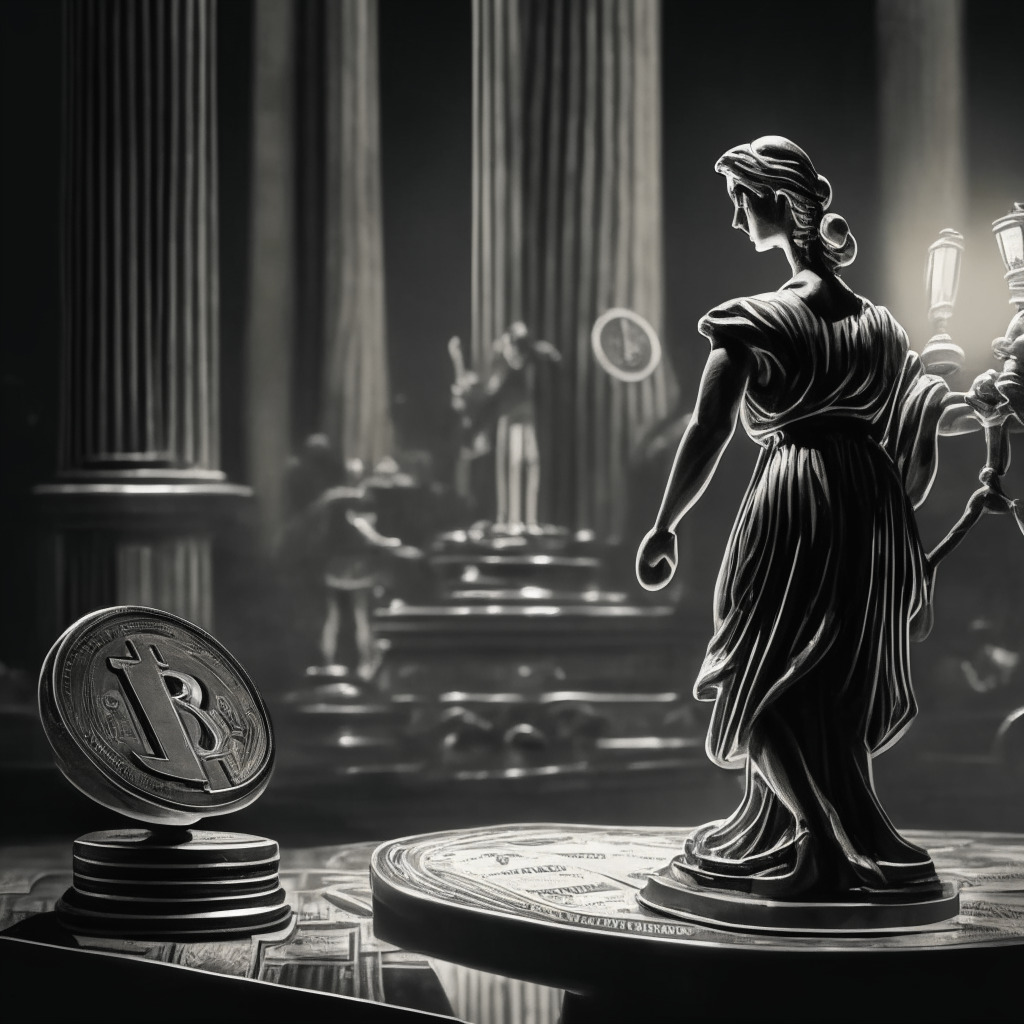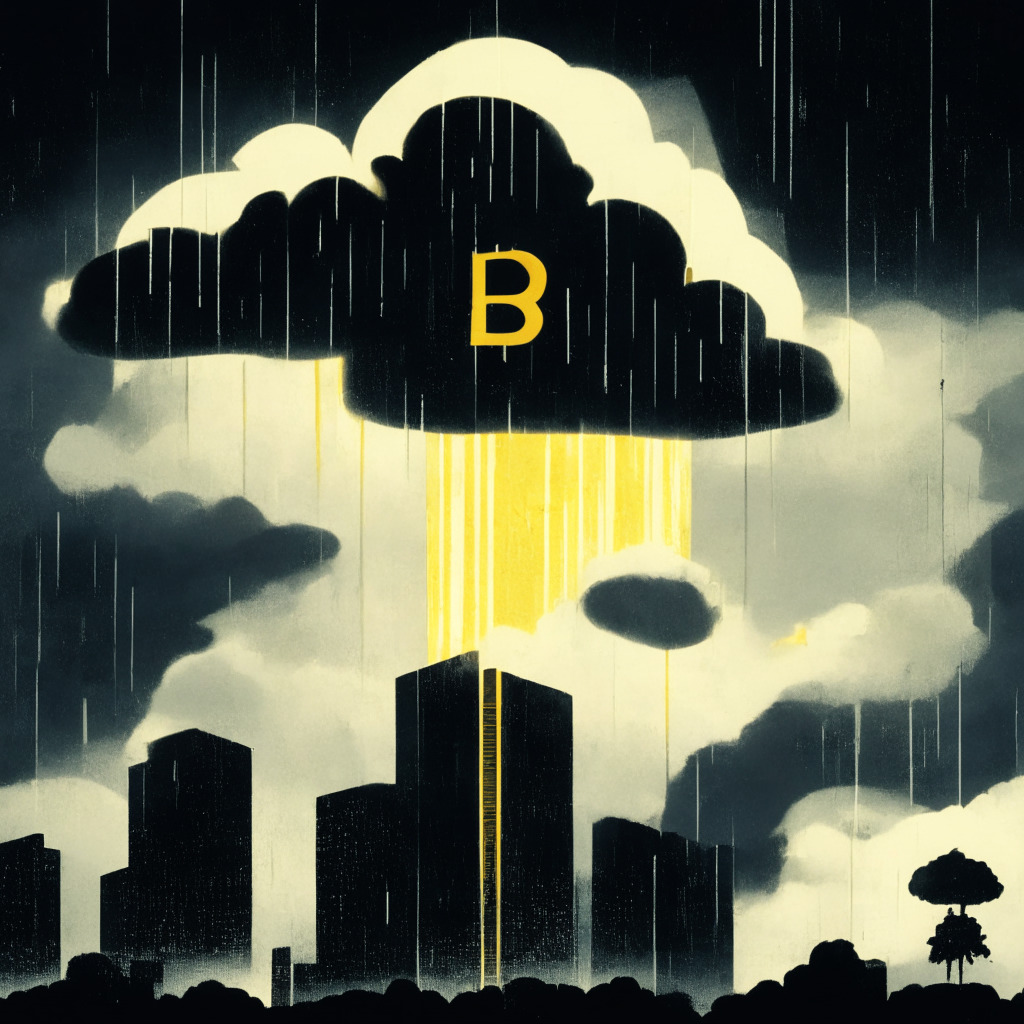“Binance Labs invests $10 million into Helio Protocol, supporting its evolution into a hub for liquid staking within the decentralized finance (DeFi) space. Despite potential smart contract vulnerabilities and market price fluctuations, liquid staking projects like Helio Protocol have the potential to transform the DeFi sector.”
Search Results for: binance
Binance’s Regulatory Dance: A Look into Taiwan’s Evolving Crypto Landscape and AML Compliance Challenges
Binance, a leading cryptocurrency exchange, has applied for registration in Taiwan under the jurisdiction’s Money Laundering Control Act and Financial Supervisory Commission compliance. This aligns with Taiwan’s efforts to implement Anti-Money Laundering laws for virtual asset service providers amidst a developing regulatory environment.
Binance Labs’ $5M Investment in Curve: A Hopeful Future Amidst Past Challenges
“Binance Labs has invested $5 million in Curve DAO Token (CRV) of the decentralized finance (DeFi) sector. While solidifying its lead as a stablecoin automated market maker, Curve had challenges, including a $70 million hack injuring its token price.”
Navigating the Regulatory Waves: Binance’s Taiwan Strategy for Anti-Money Laundering Compliance
“Binance, the world’s largest digital currency exchange, is taking steps towards Anti-Money Laundering compliance in Taiwan as it navigates the emerging regulatory landscape. The Taiwanese cryptocurrency industry’s new AML guidelines are opening opportunities for Binance’s expansion, despite recent regulatory challenges in the United States and Europe.”
Binance Labs’ $5M Pledge to Curve DAO: A Growth Bet or Security Paradox?
“Binance Labs invests $5 million into Curve DAO Token (CRV), the operating token for Curve decentralized exchange. Despite recent hacking losses, Binance co-founder, Yi He, sees this partnership as crucial for the future growth of the DeFi ecosystem.”
Binance in Crosshair: How MiCA Could Shape Crypto Firms’ Future in Europe
The world’s largest crypto exchange, Binance, faces uncertainty amidst allegations of regulatory breaches. The impending EU crypto regulation MiCA requires firms to comply in one member nation but Binance’s strategy of focusing on just a few EU countries may be risky. Robust scrutiny has led to Binance withdrawing from markets like Belgium, Netherlands, Austria, and Germany. How Binance adapts to MiCA requirements and shapes its compliance strategies will impact the future of cryptocurrency in Europe.
Binance Preparing to List SEI Network’s Native Token: A Glimpse into Pre-Listing Futures Market
“Binance is preparing to list SEI Network’s native token, SEI, on Aug. 15. Implementing pre-listing futures alongside this, according to Aevo’s CEO, will enhance price discovery. SEI’s early valuation is set at 26 cents per token, leading to a market cap close to $486 million, pushing it into the top 100 cryptocurrencies.”
Binance’s El Salvador Approval: A Milestone Amid Regulatory Concerns
“Binance, the largest crypto exchange, recently became the first fully endorsed cryptocurrency exchange in El Salvador, gaining significant credibility. However, while celebrating global regulatory approval, Binance faces accusations of disregarding regulatory standards, highlighting the persistent tug-of-war between innovation and regulation in the crypto world.”
U.S. Justice Department vs Binance: Predicting Ripple Effects on Bitcoin Prices in the Face of Scandal
“The U.S. Department of Justice is considering fraud charges against Binance, potentially impacting the crypto market. Regardless of the outcome, experts suggest the market, due to its resilience and increasing utility, could weather the storm. However, possible Binance asset drain could trigger a market crash, while the outcome could affect Bitcoin’s value trajectory by year-end.”
Binance’s Nigerian Conundrum: A Battle for Financial Dominance and Regulatory Control
“Regulatory actions in Nigeria are shaping the crypto scene, with the Bureau De Change Operators Association calling for a ban on Binance due to its pressure on the local currency. Binance’s huge trading influx poses competitive difficulty for local bodies, raising concerns of threats to liquidity. Despite embracing cryptocurrency, Nigeria remains cautious of crypto platforms operating without necessary authorization.”
Cryptocurrency Developments: Binance Licenses, Coinbase Buybacks, and More Unraveled
“Binance receives licenses from Central Reserve Bank and National Commission of Digital Assets in El Salvador fostering financial inclusion. Coinbase proposes buying back $150m of its bonds eliciting mixed investor sentiment. Bitstamp seeks to expand operations, reminding of crypto investment risks.”
Binance Secures Dual Licenses in El Salvador: A Leap towards Legitimacy vs Regulatory Rigmarole
“Binance, a major crypto exchange, acquired two operational licenses in El Salvador: Bitcoin Services Provider (BSP) and Digital Assets Services Provider (DASP). This step allows the platform to expand its services, highlighting the intersection of adopting crypto technologies and achieving regulatory clarity in a complex landscape.”
Binance’s Crypto Conversion Controversy: An Analytical Dive into Their Recent Proof-of-Reserves Report
Binance’s proof-of-reserves report reveals a major drop in its USDC reserves from $3.4 billion to $23.9 million within a month. The plunge was intensified due to the strategic shift of its USDC to Binance USD (BUSD), and the acquisition of prominent cryptocurrencies like BTC and ETH. Despite conjecture, Binance maintains a healthy financial state.
Binance Labs Investment Spree Amid Regulatory Scrutiny – A High-Risk Dance with Compliance
“Binance Labs, the venture capital subsidiary of cryptocurrency exchange, Binance, continues to invest in cryptotech companies despite potential fraud allegations and regulatory issues its parent company is facing. The recent investment was made into four distinguished startups including AltLayer, KiloEx, Kinza, and Sleepless AI.”
Binance’s Financial Conduct Amidst Unstable Conditions: A Closer Look into Crypto Exchange Transparency
“Binance’s USDC reserves dipped from $3.4 billion to a mere $23.9 million post Silvergate collapse, revealing a major conversion of reserves to BTC and ETH. In the wake of such drastic shifts, questions rise about transparency and safeguards for customer wealth in major crypto exchanges.”
Binance Labs Unleashes Funding Despite Looming Regulatory Threats: A Crypto Stage Paradox
“Binance Labs exhibited significant investment activity last week, fuelling blockchain innovation by supporting four entities, including blockchain scaling and Web3 gaming startups. These funding rounds, part of their Most Valuable Builder incubator program, reinforce their commitment to the blockchain space, despite potential legal challenges.”
Binance’s Surprising Shift to Lesser-Known Stablecoins: Market Intrigue or Strategy Unfolded?
Coinbase CEO, Brian Armstrong, revealed that Binance traded a chunk of its USDC for another stablecoin. This reflects Binance’s increasing interest in newer stablecoins, despite market risks. With its turn towards the lesser-known FDUSD, Binance’s unusual decision indicates a notable trend within the crypto markets.
Bitcoin’s Turbulent Ride: NFP Data, Cash App Influence and Binance’s New Trading Pairs
“The crypto market is in suspense due to Bitcoin’s performance above $29,000. US Non-Farm Payrolls data could affect Bitcoin’s trajectory. Block Inc’s consistent performance and Binance’s new trading pairs have contributed to Bitcoin’s surge. However, bearish undertones suggest a possible downward trend.”
Navigating Rough Waters: Binance’s New Compliance Leadership Amid Regulatory Challenges
“Binance announced that Kristen Hecht assumed the role of Deputy Chief Compliance Officer amidst potential fraud charges. Her responsibilities include strengthening compliance provisions, combating financial crime risks and overseeing anti-money laundering teams. This occurs as Binance navigates through regulatory scrutiny in the US and Europe.”
Crypto Conundrum: China’s Unofficial Crypto Boom Despite Ban and Its Impact on Binance
Despite China’s ban on cryptocurrencies in September 2021, Chinese traders reportedly facilitated $90 billion worth of crypto trades on Binance in one month this year, accounting for one-fifth of Binance’s global volume. These trades are enabled through virtual private networks, allowing users to bypass censorship. However, this situation could escalate Binance’s regulatory challenges in the U.S. despite its growing popularity in the Chinese market.
Bitcoin Under $29k: A Product of Binance Worries or Just a Familiar Pattern?
“Bitcoin (BTC) risks plunging below a key support level at $29,000 as concerns over Binance impacts the market. However, many believe this is an extension of familiar patterns and could lead to substantial future price movements. Market dynamics are being influenced by these factors, and thorough understanding is crucial for informed decisions.”
Binance Bolsters Defense with New Deputy Chief Amid Mounting Regulatory Scrutiny
Binance, the renowned cryptocurrency exchange, has appointed Kristen Hecht as its new Deputy Chief Compliance and Global Money Laundering Reporting Officer amid potential fraud charges from US regulators. Hecht will monitor key areas while managing company’s compliance program and liaising with regulators and industry bodies.
Binance Facing Fraud Charges: Potential Ripple Effects on Crypto Industry
Popular crypto exchange Binance could potentially face fraud charges by the U.S. Department of Justice, according to CoinDesk. Legal alternatives such as fines and deferred or non-prosecution agreements are being considered due to potential industry-wide implications.
Unmasking Binance’s Latest Dusting Attack: The Dark Side of Crypto and How to Fight Back
In the face of rising digital currency scams, CEO of Binance, Changpeng ‘CZ’ Zhao warns the crypto community about a new trick where scammers create addresses resembling that of the user, initiating small “dust” transactions. Such scams can lead unsuspecting users into inadvertently sending funds directly to the scammer. Stronger security measures, including adopting a blockchain domain, are recommended.
Impending U.S. DoJ Action against Binance: The Possible Catalyst for a Crypto Market Meltdown
The US Department of Justice (DoJ) reportedly deliberates on fraud charges against Binance, one of the world’s largest crypto exchanges. A potential indictment could cause an exodus from Binance, triggering losses and a broader market panic. Authorities are considering fines and deferred prosecution agreements to minimize consumer harm. Binance prepares for potential fallouts by securing assets and maintaining a healthy ratio for mass withdrawals. The incident highlights complexities in the world of cryptocurrencies, with watchful scrutiny on the looming regulatory battle.
Navigating the Regulatory Tightrope: A Closer Look at Potential Charges against Binance
“The Justice Department mulls charging Binance with fraud, raising concerns about consumer impact and future regularity measures. While legal accountability for crypto exchanges promotes market trust, over-regulation might stifle innovation, presenting a delicate balance for the future of the crypto industry.”
Potential DOJ Binance Fraud Allegations: A Tug-of-War Between Justice and Crypto Stability
The U.S. Department of Justice (DOJ) is reportedly considering charging crypto exchange Binance with fraud allegations, sending ripples of concern through the blockchain community. This highlights ongoing skepticism around the authenticity and security of blockchain technology and crypto markets, yet also underscores the system’s internal checks and balances against misleading and fraud.
Binance Bolsters Crypto Market: A Bold Rescue of Curve’s CRV Amid Collapse Fears
After an exploit saw Curve’s native token CRV plummet, market makers at Binance upped their buy orders within 2% of the mid-price from 500,000 to over 1 million CRV. This unusual response to a falling currency is seen by many as a strong supporting move that may have prevented widespread fallout in the decentralized finance market. Despite this, CRV fell by over 14%, sparking alarm across the sector.
Binance Launches in Japan: A Strategic Move or a Regulatory Challenge?
“Binance has entered the Japanese market with Binance Japan K.K., offering an unrivaled number of tradable tokens. The move hopes to stimulate the Japanese digital-asset arena, given the country’s robust tech innovation and interest in blockchain. The new platform is a rebranding of the acquired Sakura Exchange BitCoin.”
Binance’s Chinese Operations Allegations: Unraveling the Complexities of Global Crypto Regulations
Recent allegations suggest Binance, the leading cryptocurrency exchange, possibly continued operations in China despite the country’s ban on cryptocurrencies. Reports claim large-scale business deals ensued, despite Binance denying access to China-based users. These allegations raise important considerations about global crypto markets, regulatory frameworks, and the necessity of abiding by individual nation’s financial regulations.
Binance Under Regulatory Siege: An Examination of Crypto Market Challenges and Future Solutions
“Binance, a top cryptocurrency platform, may be closing its US-based arm amidst regulatory pressures. CEO Brian Shroder opposes the shutdown due to its impact on exchange users. Meanwhile, Binance is expanding globally, emphasizing diversification and compliance with local regulations.]”
Binance’s Potential U.S. Exit: A Catalyst for Crypto Regulatory Clarity?
“Binance, the crypto exchange platform, is considering shutting its US operations amid intensified regulatory scrutiny and allegations of operating as an unregistered securities exchange. This decision is potentially significant for future crypto adoption, regulatory compliance, and the ongoing institutionalization of cryptocurrencies.”































